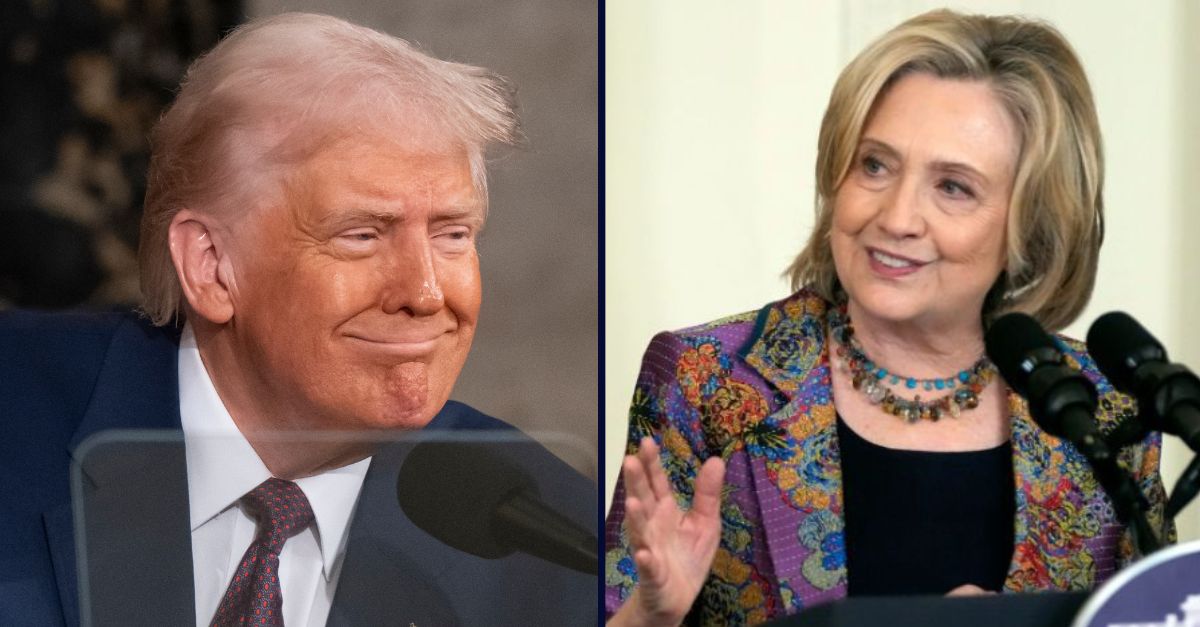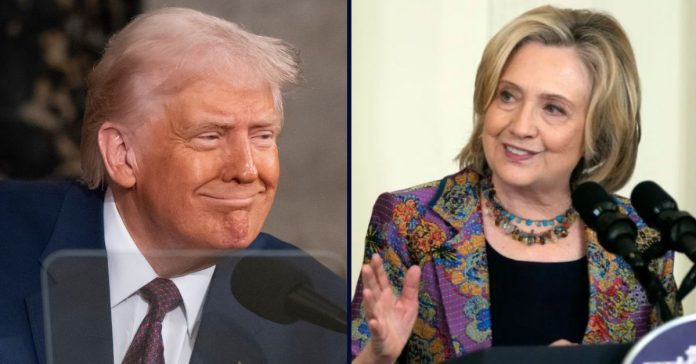
Left: President Donald Trump addresses a joint session of Congress on Capitol Hill in Washington, Tuesday, March 4, 2025 (AP Photo/Alex Brandon). Right: Hillary Clinton speaks during an event with first lady Jill Biden to celebrate the 2023 Praemium Imperiale Laureates in the East Room of the White House, Tuesday, Sept. 12, 2023 (AP Photo/Alex Brandon).
President Donald Trump”s private legal team returned to court on Tuesday with the hope of convincing the 11th U.S. Circuit Court of Appeals to revive a thoroughly dismantled civil RICO lawsuit against Hillary Clinton and a collection of Democrats and entities he blamed for conspiring to bankroll “an unthinkable plot” to tar the 2016 Trump campaign, cloud his first term through “a sinister link” to Russia, and harm his business interests.
In March 2022, while special counsel John Durham’s criminal investigation of the Russia investigation was ongoing, Trump filed the RICO suit against Clinton, the Democratic National Committee, “Steele Dossier” compiler Christopher Steele’s company Orbis Business Intelligence, Fusion GPS, and many other high-profile defendants who were later removed from the case.
Multiple efforts to disqualify U.S. District Judge Donald M. Middlebrooks, a Bill Clinton appointee, failed, and the judge wrote he had “never met or spoken with” the Clintons before he tossed out the revamped version of the case, which included basic mistakes, in 2023.
Sanctions against Trump lawyers followed, as Middlebrooks found the amended complaint was a “shotgun pleading” that substituted substance “with length, hyperbole, and the settling of scores and grievances,” producing a “frivolous” and “harmful” case.
“This is a deliberate attempt to harass; to tell a story without regard to facts,” Middlebrooks wrote. “In order to understand the scope of this abuse, multiply the above discussion by thirty-one defendants and their lawyers, forced to try to analyze and defend against the sprawling Complaints. I sifted through the thread of allegations against each defendant only to find they added up to no cognizable claim. And the pleadings were drafted in a way to disguise that fact.”
On Tuesday, Chief U.S. Circuit Judge William Pryor, a George W. Bush appointee, U.S. Circuit Judge Andrew Brasher, a Trump appointee, and U.S. Circuit Judge Embry Kidd, a Joe Biden appointee, listened as Trump appellate lawyer Richard Klugh made his case for vacating the dismissal.
After Brasher questioned Klugh on whether elements of an injurious falsehood claim survived the statute of limitations, Klugh suggested the defense should have filed a motion for a “more definite statement,” which would have enabled Trump lawyers to show in specifics how the “injurious” Russia allegations damaged Trump’s business interests, for instance, an arrangement with the PGA at Doral.
“The falsehoods were fundamental. Essentially, to allege an individual is articulating — and has a secret backchannel to manufacture evidence, that there’s a secret backchannel between the president and the Kremlin — what could be more, a greater stain on an individual than that? In terms of not just business in the United States but business all over the world,” Klugh said.
Pryor jumped in here to highlight “one of the problems I’m having with this claim.”
“As you know, if the district court dismisses a claim and does so on multiple grounds, you’ve got to knock down every one of those grounds. And one of the grounds, as I understand it, was the failure to plead special damages, which the district court described as a crucial element of the claim,” Pryor said. “I don’t see where you’ve really attacked that.”
“We have it in our briefs,” Klugh answered, before claiming his side “established” fraud “in droves.”
After running up against the clock and asking if he could finish, Klugh used his last minute to criticize Middlebrooks’ characterization of the lawsuit as “hopelessly complicated.”
“Hopeless is the word that he used in terms of trying to understand our complaint because of a shotgun pleading argument that no party had moved for,” he said.
That set Pryor off.
“Mr. Klugh, I can read this complaint, it’s a shotgun pleading,” the chief judge said. “There’s no question about that, is there?”
As Klugh attempted to articulate “our goal,” Pryor interrupted.
Love true crime? Sign up for our newsletter, The Law&Crime Docket, to get the latest real-life crime stories delivered right to your inbox.
“This is a classic shotgun pleading,” he added. “It incorporates by reference hundreds of paragraphs into succeeding counts.”
“Our view is that the remedy for that,” Klugh began to answer, before being interrupted again.
“Well, it wasn’t dismissed on that ground, it was referenced in terms of sanctions. It’s clearly a shotgun pleading,” Pryor stated.
“Our position is that it was dismissed on that ground, Your Honor,” Klugh attempted to clarify.
“I know that’s your position. It does not appear to be what the district court actually ruled,” Pryor replied.
Up next was David Kendall, an attorney for Hillary Clinton arguing the issues on behalf of all appellees other than Orbis Business Intelligence, former Neustar chief technology officer Rodney Joffe, and Charles Halliday Dolan. The claims against the latter three failed for lack of personal jurisdiction.
The district court established that Dolan, a public relations executive who emailed with acquitted Durham defendant Igor Danchenko, was not the former DNC chairman or New York resident that Trump’s team claimed he was.
Rather, Dolan said in seeking sanctions, his involvement with Clinton’s campaign was volunteering to knock on doors in New Hampshire in the last week before the 2016 election.
Kendall said the Trump team, rather than alleging defamation, “pitched their tent on injurious falsehood, which certainly requires specific injury to business or property.”
“They’ve not alleged any of that, and they’ve got to allege that falsehoods were aimed at the plaintiff to deprive plaintiff of property or business,” Kendall said. “It’s like one of the failed requirements in the RICO pleadings. In RICO, you’ve got to allege damages to business or property — there is none.”
“The damages alleged here are political in nature,” he added.
Brasher jumped in at this point, asking about whether the statute of limitations comes into play to potentially keep alive injurious falsehood claims.
“On the injurious falsehood, would you agree with me there are at least some of the statements that came within the statute of limitations — so the statute of limitations argument doesn’t resolve the injurious falsehood claim?” he asked.
“I don’t think any survive here. First of all it’s a two-year statute. I don’t think there’s a tolling agreement of any kind that would capture those past statements,” Kendall answered. “There are a few statements made within that two years but they’re not alleged to be injurious falsehood[.]”
Kendall then affirmed “this was a shotgun pleading, among its other defects.”
“I thought I heard counsel say that we should have moved from a more definite statement,” he continued. “That is a possible remedy for a defendant. But instead, we said, look, the shotgun pleading is only part of the problem. The problems really are failure to allege the elements of the claim, in what is claimed RICO, malicious prosecution.”
“There were 204 pages of briefing on the first complaint of motions to dismiss. The plaintiff then said, wait a minute I’m going to amend the complaint. So the trial court said, I’ll give you an extension. You can correct in as efficient a manner as possible any deficiencies in the claim,” Kendall said.
“Plaintiff didn’t do that, they doubled down,” he added.
Brasher had a follow-up question.
“You say they didn’t allege special damages,” he said. “Why isn’t the allegation that the plaintiff was forced to incur expenses in the amount of $24 million in defending against, you know, allegedly unjustified investigations and things like that. Why isn’t that special damages?”
“You’ve got to have some specificity. There was no specific link in any of those so-called falsehoods to any particular damages. So I think that’s why that fails,” Kendall answered.
Brasher then posed one final question for Kendall about whether the Trump RICO suit really was dismissed “for shotgun pleading reasons,” which Klugh insisted was the case.
“No, Your Honor,” Kendall said. “Its defects” — failure to state a claim — “were much, much worse.”
Marisa Sarnoff contributed to this report.

